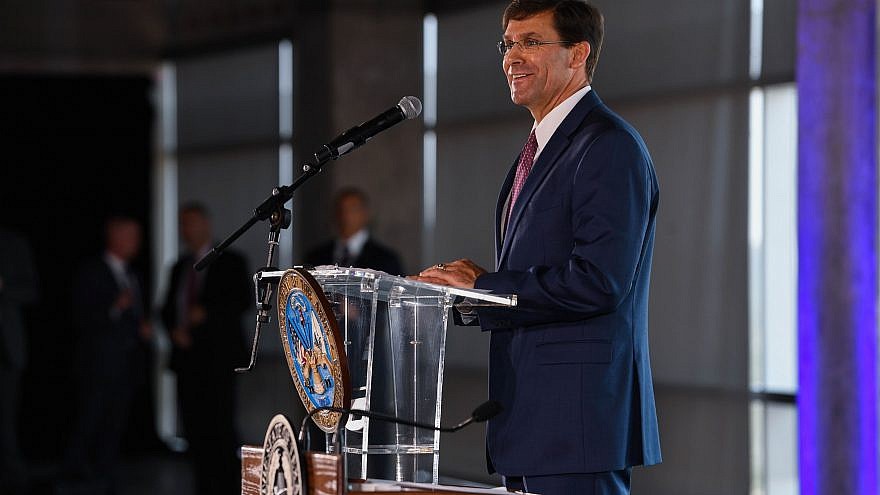After more than six months without a permanent U.S. Secretary of Defense, Mark Esper, who previously served as acting U.S. Defense Secretary and U.S. Secretary of the Army, was confirmed on Tuesday to lead the Pentagon on a full-time basis.
Before arriving at the Pentagon, Esper, 55, served in the U.S. Army during the 1991 Gulf War, and held roles on and off Capitol Hill. He and his wife, Leah, have three kids.
Esper replaced Patrick Shanahan in June as acting Secretary of Defense after Shanahan withdrew his nomination to serve in the position permanently. The decision came after USA TODAY published an explosive report about alleged domestic violence between him and his former wife, Kimberly Johnson.
“Mark Esper makes a fine choice for Defense Secretary, and he has a full plate coming in to the role,” Security Studies Group senior fellow Matthew Brodsky told JNS. “The immediate challenges are what the intelligence community refers to as ‘The Big Four’: China, Russia, North Korea and Iran. The first two pose great power challenges requiring a long-term strategy while the latter two pose emerging nuclear power challenges that require near-term solutions.”
Moreover, he said, “Syria is another challenge where I think the U.S. will be better served now by someone who fully appreciates how Iran and Russia are intimately linked to the problem there.”
As defense secretary, Esper’s most immediate challenge will be dealing with the increasing tensions with Iran since the United States withdrew in May 2018 from the 2015 nuclear deal, reimposing sanctions lifted under it and enacting new financial penalties against the regime.
More recently, Iran shot down a U.S. drone—a RQ-4A Global Hawk that was flying in international airspace above the Strait of Hormuz, though claimed that it was flying above its own airspace. In doing so, Iran’s Islamic Revolutionary Guards Corps’ top commander, Gen. Hossein Salami, said his country is “completely ready for war.”
Trump called off retaliatory strikes against Iran for that action, saying that such a response was “not proportionate to shooting down an unmanned drone.”
Nonetheless, the United States conducted a cyber-attack against Iran.
Last week, Trump confirmed that the USS Boxer, a U.S. Navy ship, “immediately destroyed” an Iranian drone in the Strait of Hormuz. (CENTCOM Commander Gen. Kenneth McKenzie told CBS News on Tuesday that the ship may have shot down two drones.)
“I agree we do not want war with Iran, we are not seeking war with Iran, we need to get back on the diplomatic channel,” said Esper during his confirmation hearing last week in front of the Senate Armed Services Committee.
Esper told reporters after a closed-door meeting at NATO last month, “I discussed the need to internationalize this issue by encouraging NATO allies and regional partners to voice their opposition to Iran’s bad behavior and to help us deter further provocative acts by improving maritime security.”
“The department’s mission remains clear: to deter conflict and, if necessary, fight and win on the battlefield,” he added.
Additionally, at his confirmation hearing, Esper said that Turkey acquiring the S-400 missile-defense system last week was “disappointing.”
“Acquisition of the S-400 fundamentally undermines the capabilities of the F-35,” he stated. “They are a NATO ally, a longstanding and capable ally. It is very disheartening to see how they have drifted over the past several years.”
In response, the United States cut off Turkey last week as an F-35 recipient.
Regarding Turkey, Brodsky said, “I think Esper understands that Turkey, at least under [President Recep Tayyip] Erdoğan, is much closer to irredeemable than those who came before him. This will, incidentally, make Jordan even more important as an ally for basing and training and other roles. That should be seen as a positive development from Israel’s standpoint given the premium they tend to place on Jordan’s security and stability, and also a positive from the standpoint of our Gulf allies.
“Someone needs to play hardball with Turkey, and I think Esper will be more willing to do so,” he said.
Brodsky added that with Israel, “I don’t see much changing because the relationship is more solid than it has ever been, and that’s because President Trump loves Israel. It’s a kishka issue for President Trump. He gets Israel.”
‘Knows the risks and range of options’
Former Pentagon official Michael Rubin agreed, saying that Esper appears to have strong pro-Israel credentials.
“On a scale of Chuck Hagel to 10, with 10 being the most pro-Israel, Esper is probably an eight or nine,” Rubin told JNS, referring to the former defense secretary under President Barack Obama, who faced some opposition from within the pro-Israel community.
Rubin said that Esper “understands the strategic relationship with Israel and also understands that the alternative is no alternative.”
“It’s hard to say a defense secretary should be more ‘pro-Arab’ when even the moderate Arab states are generally now allied with Israel. Esper is cautious on Iran, but then again, so is most of the Pentagon,” he continued. “That said, if given the order to utilize the military against Iran, Esper is someone who knows both the risks and the full range of options, and will do what’s needed for victory.”
Along with Iran, according to Rubin, Esper’s biggest challenges will come from somewhere outside the Middle East.
“China, China and China. That will be the biggest issue for every defense secretary for the next 50 years—whether China is rising or, equally likely, declining,” he said. “That is why the Israelis are being so short-sighted in some of their commercial and military dealings with China.”


























